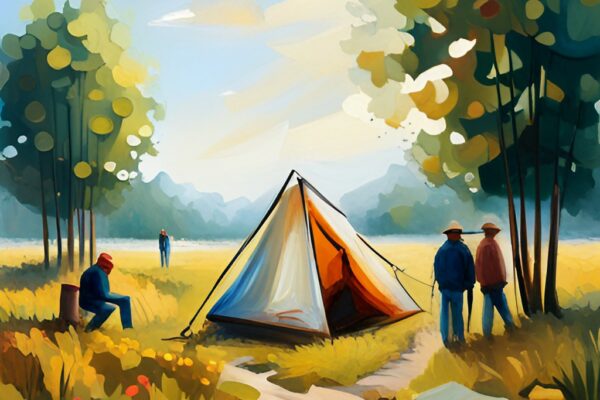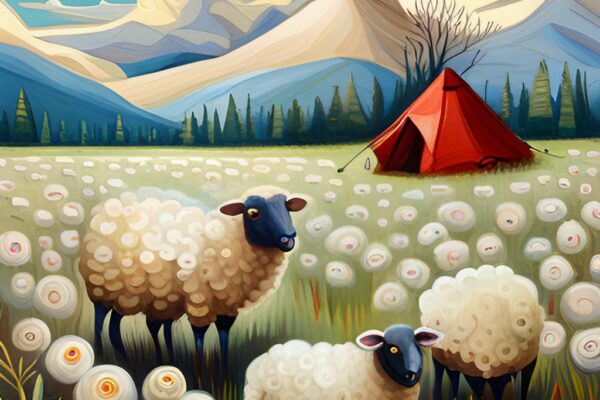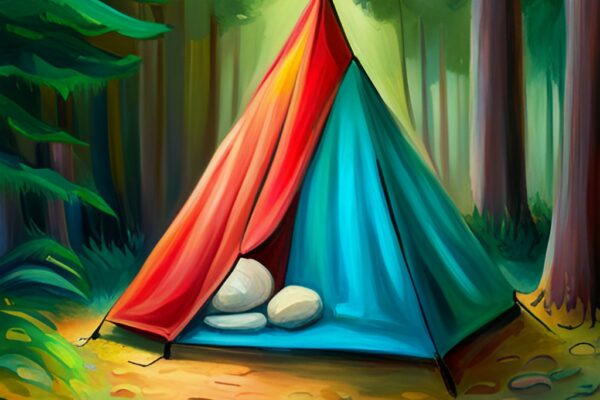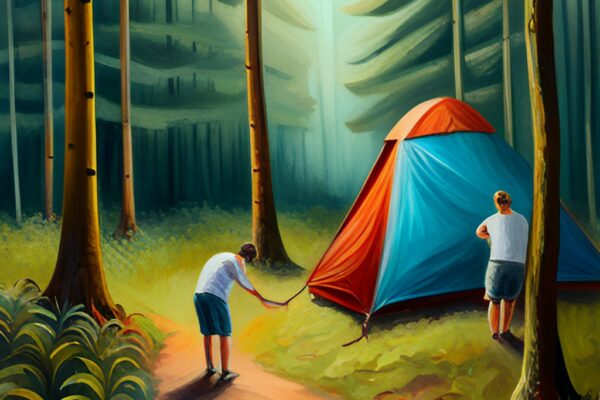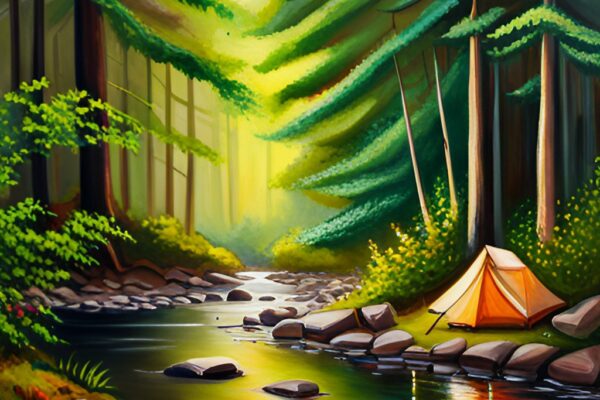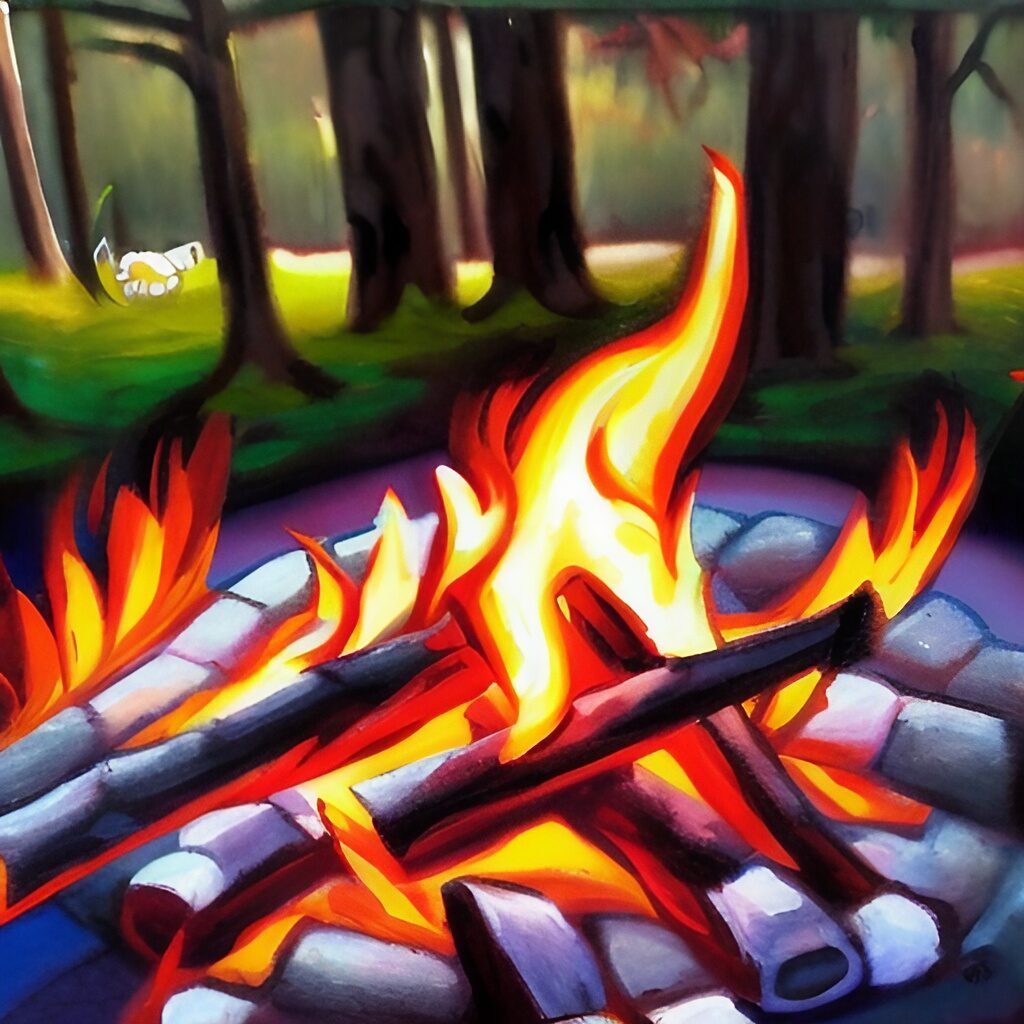
Have you ever found yourself sitting around a campfire, enjoying its peace, when it suddenly crackled loudly and startled you?
I know that has happened to me!
Why does a campfire pop? What causes some campfires to burn loudly and boisterously while others are relatively quiet?
A campfire pops or crackles due to pockets of trapped gas being released from the wood as it burns. How often you hear a campfire pop depends upon how much water and sap are in the wood and the age of firewood used.
When you figure out why campfires pop, you can take steps to minimize it.
- Understanding What Makes a Campfire Pop – Why Campfires Pop
- So What Causes A Campfire to Pop? – Why Campfires Pop
- Does it Matter if a Campfire Pops? – Why Campfires Pop
- How to Prevent or Minimize Campfire Popping – Why Campfires Pop
- Test for Moisture Content in Your Wood – How to Prevent or Minimize Campfire Popping
- Look for Aged Firewood Rather Than Fresh Ones – How to Prevent or Minimize Campfire Popping
- Dry Out Moist Firewood – How to Prevent or Minimize Campfire Popping
- Choose a Dry Area to Build Your Fire – How to Prevent or Minimize Campfire Popping
- Build a Teepee Shape to Minimize Popping – How to Prevent or Minimize Campfire Popping
- Conclusion – Why Campfires Pop
- Frequently Asked Questions – Why Campfires Pop
- 1. What Causes Campfires to Pop and Crackle? – FAQs
- 2. Is it Safe to Sit Close to a Popping Campfire? – FAQs
- 3. Can Campfire Sparks Start Wildfires? – FAQs
- 4. How Can I Prevent My Campfire From Popping Too Much? – FAQs
- 5. Is There Any Wood That is More Prone to Popping than Others? – FAQs
- 6. What Should I Do if a Log in My Campfire Suddenly Pops Out of the Fire Pit? – FAQs
- 7. Can Cooking Over a Campfire Increase the Amount of Popping and Crackling? – FAQs
- 8. Is There a Way to Reduce the Noise of a Campfire Without Extinguishing It? – FAQs
Understanding What Makes a Campfire Pop – Why Campfires Pop
For some, fire-making is an intuitive matter more than a scientific one. Understanding fire science can make building them far easier for others like myself!
Fire creation and longevity are three components; heat, oxygen, and fuel. You get fire when you apply heat to a fuel source and have an ample oxygen supply!
Heat is what causes combustion, or the process of burning something. Typically this will be a lighter, a match, or a Flint-based striker.
Fuel is what burns and sustains the fire. The fuel is your wood, kindling, and tinder.
Oxygen is what keeps the combustion process going by generating more heat. How you build your campfire and your elevation can impact how much oxygen is available.
Once you have all three elements present, what happens next to cause popping?
So What Causes A Campfire to Pop? – Why Campfires Pop
As the fire is burning, the heat causes the wood to decompose. As the wood decomposes, the cellulose heats up and breaks down.
Any moisture in the wood, whether water or sap, is caught in pockets of cellulose. As these pockets of moisture heat up, they turn into steam, the gaseous form of water.
This steam exerts pressure on the surrounding wood, and as pressure builds, it cracks the wood to release the steam, which creates the popping sound.
How much a campfire pops depends upon a few factors, such as the wood’s moisture content, the firewood’s age, and how you build your fire.
The moisture content of the wood is the number one indicator of whether your fire will pop frequently. The more moisture in the wood, the more pop you will hear.
The age of the wood you use will significantly impact your fire, as green or freshly cut wood has a higher moisture content than wood that has been cured.
Building a campfire with oxygen flow and location in mind can also significantly impact the popping level you hear.
Does it Matter if a Campfire Pops? – Why Campfires Pop
We’ve established a campfire pops due to a series of chemical reactions. The water and sap in the wood turn into gas, creating pressure that cracks the wood when released.
So now the question begging to be answered is, does it matter if a campfire pops?
Yes, and No.
There are two things to consider regarding why you may want to minimize popping in your campfire. Campfire popping affects the efficiency and longevity of your fire as well as its safety.
A fire built with high moisture content wood will not burn as efficiently as a campfire made of dried wood. The moist wood will be harder to get burning and will be harder to keep burning.
This isn’t ideal if you’re relying on fire for warmth or cooking a meal after a long day of hiking.
When a campfire makes a popping sound, you can often see sparks flying. Sometimes these sparks are minimal, and other times they are larger. The more popping, the more likely there will be sparks.
These sparks can be fine if your fire is contained in a metal pit or built in a pre-soaked area with stones.
The sparks’ from popping can be concerning if they are large and fly out of your intended burn area. This sparking poses a serious safety concern if your fire is close to a tent, camping chairs, or even dry grasses.
This unpredictability can be dangerous for anyone sitting near the fire, creating a need to sit further away to minimize your chances of getting burned.
Sitting further away can make it harder to feel warmth and cook your food. If your purpose is warmth and cooking your dinner, this creates an unideal situation.
How to Prevent or Minimize Campfire Popping – Why Campfires Pop
Knowing how to minimize campfire popping is essential whether you’re using your fire for survival or simply want to have a fun and safe camping trip with friends.
Test for Moisture Content in Your Wood – How to Prevent or Minimize Campfire Popping
If your firewood was recently cut, exposed to rain, stored in an area of high humidity, or not seasoned long enough, it could have a considerable amount of moisture and sap.
Knowing how moist your wood is before starting your fire can help inform you how to build your fire best to minimize popping.
If you suspect you may have damp wood or need to purchase wood on-site, you can buy a relatively cheap moisture meter tool. While it’s unnecessary, it can be helpful when purchasing wood that hasn’t been stored indoors.
The wood with the lowest moisture content is kiln-dried firewood. Kiln drying is a process that effectively removes moisture from the wood while preventing damage to the wood. This is the best option for minimal popping if you can bring wood to your site.
Look for Aged Firewood Rather Than Fresh Ones – How to Prevent or Minimize Campfire Popping
The wood with the most moisture content will always be fresh from the tree, known as greenwood. Wood that has just been cut will have a high sap content and can have a moisture content of well over 100 percent!
The percentage of water in wood refers to the amount of water in the wood instead of dry matter in the wood.
If you purchase wood that hasn’t been aged, it will have a higher moisture content because aging, or curing, is a process that allows the wood to dry out slowly over time. Aging can take anywhere from 6 months to 2 years to complete!
Firewood that has been adequately seasoned generally has 20 percent or less moisture.
If you don’t have firewood camping, look for fallen trees and branches. These have a better chance of having less moisture, especially if you can find some that appear to have been down for some time.
Dry Out Moist Firewood – How to Prevent or Minimize Campfire Popping
There is an excellent way to dry your firewood if it is wet or simply moist, and you have no other options. All you need is a firestarter and some tinder to start the fire.
If you’re at a campsite with a fire pit, build a small teepee shape in the middle of the pit with a few pieces of wood. There should be enough wood to get a fire going but not much; we want this for warmth, not longevity.
Next, you need to take all your wet pieces of wood and line the firepit with them, standing them up on their ends. This setup gets them close enough to the fire for drying out but not too close that they’ll start to burn immediately.
Now it’s time to light your teepee fire and let it burn! This fire will likely pop a fair amount since your wood is wet. The sole purpose of this fire is to provide enough heat to dry out all the wood surrounding it in the pit.
You should be able to see steam rising from the logs surrounding your small fire. Once the steam stops or the fire goes out, you can use the wood you dried for a much quieter and safer campfire!
Choose a Dry Area to Build Your Fire – How to Prevent or Minimize Campfire Popping
Wood is highly porous and as such, is susceptible to the conditions around it.
If you build your campfire on a damp site, the wood will likely take on moisture from the ground it’s built upon.
Searching for a dry area to build your fire can be helpful to ensure minimal popping. Dirt or gravel tends to hold less water than grass or leaves, making them a better option for a dry space.
Build a Teepee Shape to Minimize Popping – How to Prevent or Minimize Campfire Popping
The shape you build your fire in can help to minimize drawing moisture from the damp ground.
A teepee shape is an excellent choice for minimizing campfire popping. A teepee shape allows for optimal oxygen flow, which is crucial if your wood is wet.
Additionally, a teepee shape minimizes the surface area of your wood touching the ground, so it isn’t as big of a concern if the soil is wet.
Check out our detailed article on how to build a campfire if you want to learn more about the other steps!
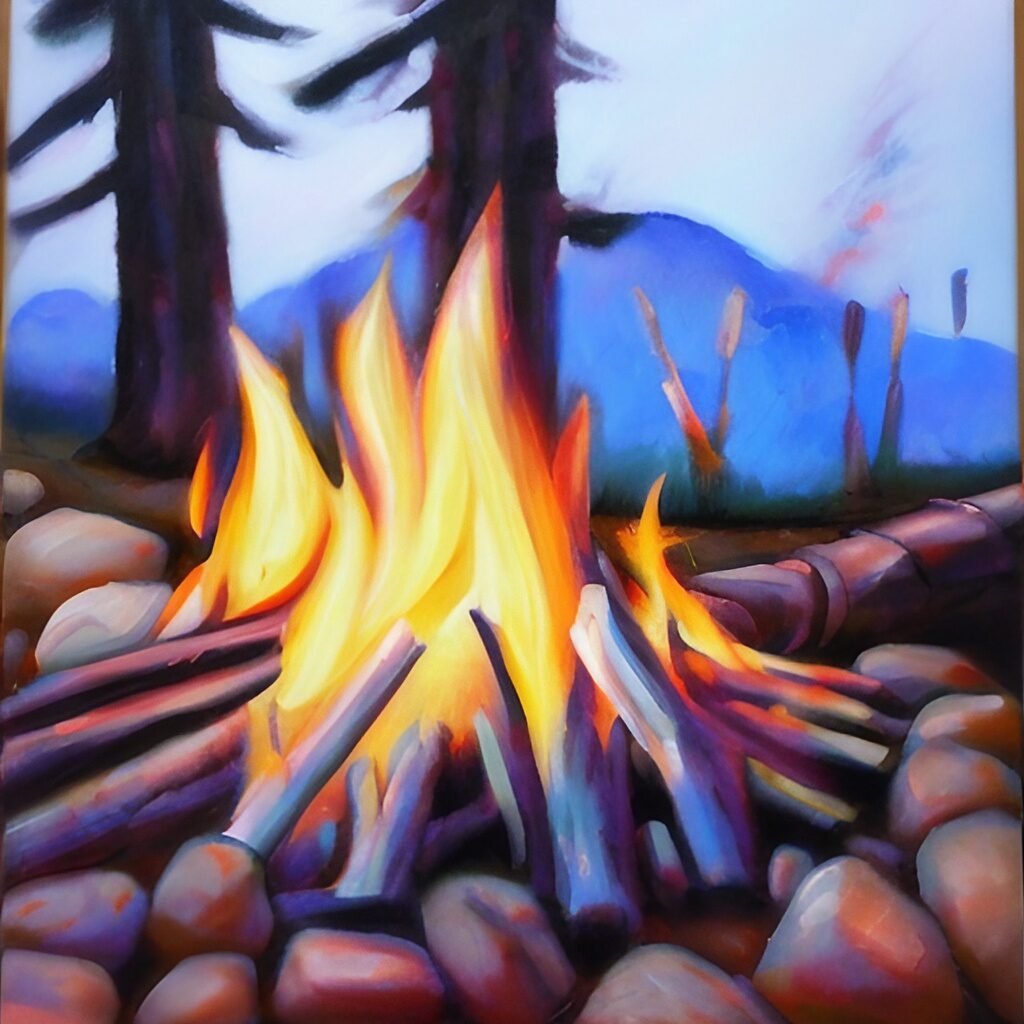
Conclusion – Why Campfires Pop
A campfire can give us warmth, unite us with others, and provide peace. A campfire’s popping sound can be a soothing noise that indicates the wood you’re burning has water or sap in it.
A campfire made of high-moisture wood can be dangerous in survival settings and hazardous to people and property. Kiln-dried wood is the best option for minimal popping, so buy some firewood, start your fire, and soak up its warmth!
Frequently Asked Questions – Why Campfires Pop
1. What Causes Campfires to Pop and Crackle? – FAQs
Because of the moisture content in wood, campfires pop and crackle. As the wood heats up, the water inside the cells condenses into steam and attempts to escape. It makes a popping or cracking sound when this happens.
2. Is it Safe to Sit Close to a Popping Campfire? – FAQs
It is generally safe to sit close to a blazing campfire if you are not too close and use appropriate safety precautions such as keeping a bucket of water nearby.
3. Can Campfire Sparks Start Wildfires? – FAQs
If sparks from a campfire land on dry vegetation or other flammable materials nearby, they can start a wildfire. To avoid this, keep your fire in a fire pit or ring and never leave it unattended.
4. How Can I Prevent My Campfire From Popping Too Much? – FAQs
To avoid overheating your campfire, use seasoned firewood with low moisture content and avoid burning green or freshly cut wood. You can also try building a smaller fire or using a fire screen to contain sparks.
5. Is There Any Wood That is More Prone to Popping than Others? – FAQs
Because of their higher resin content, certain woods, such as pine and cedar, are more likely to pop than hardwoods, such as oak or maple.
6. What Should I Do if a Log in My Campfire Suddenly Pops Out of the Fire Pit? – FAQs
If a log in your campfire suddenly pops out of the fire pit, carefully place it back into the fire with tongs or another tool. Make no attempt to pick it up with your hands.
7. Can Cooking Over a Campfire Increase the Amount of Popping and Crackling? – FAQs
Cooking over a campfire can result in more popping and crackling due to oils and fats dripping onto the flames.
8. Is There a Way to Reduce the Noise of a Campfire Without Extinguishing It? – FAQs
To reduce noise from your campfire without completely extinguishing it, try using more dry kindling or small pieces of wood instead of larger logs. This results in a smaller flame with less heat and moisture content and less popping and crackling noise.




